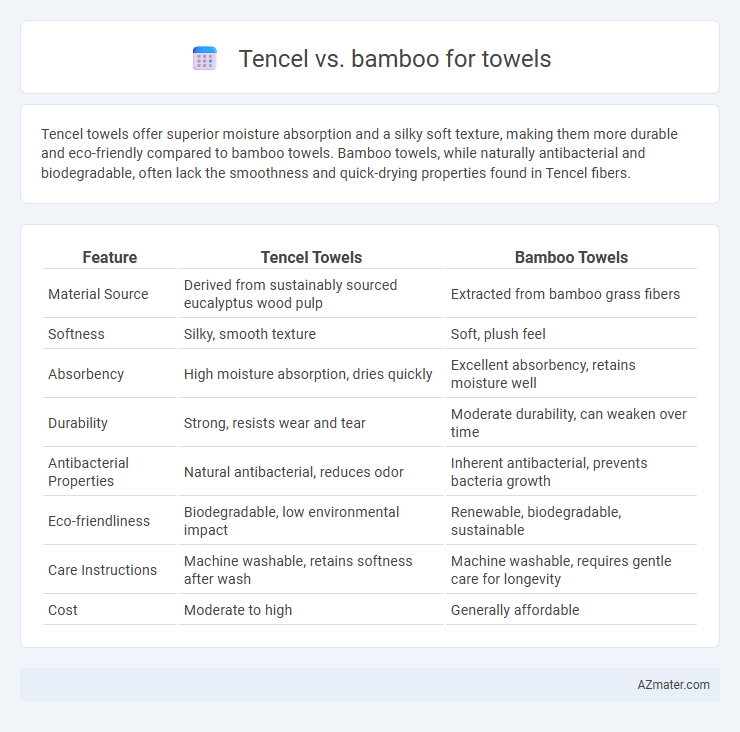Tencel towels offer superior moisture absorption and a silky soft texture, making them more durable and eco-friendly compared to bamboo towels. Bamboo towels, while naturally antibacterial and biodegradable, often lack the smoothness and quick-drying properties found in Tencel fibers.
Table of Comparison
| Feature | Tencel Towels | Bamboo Towels |
|---|---|---|
| Material Source | Derived from sustainably sourced eucalyptus wood pulp | Extracted from bamboo grass fibers |
| Softness | Silky, smooth texture | Soft, plush feel |
| Absorbency | High moisture absorption, dries quickly | Excellent absorbency, retains moisture well |
| Durability | Strong, resists wear and tear | Moderate durability, can weaken over time |
| Antibacterial Properties | Natural antibacterial, reduces odor | Inherent antibacterial, prevents bacteria growth |
| Eco-friendliness | Biodegradable, low environmental impact | Renewable, biodegradable, sustainable |
| Care Instructions | Machine washable, retains softness after wash | Machine washable, requires gentle care for longevity |
| Cost | Moderate to high | Generally affordable |
Introduction: Tencel vs Bamboo Towels
Tencel and bamboo towels both offer eco-friendly alternatives to traditional cotton, with Tencel-derived fibers sourced from sustainably managed eucalyptus forests and bamboo fibers harvested rapidly from fast-growing bamboo stalks. Tencel towels are renowned for their exceptional softness, moisture-wicking properties, and durability, while bamboo towels excel in natural antibacterial qualities and high absorbency. Choosing between Tencel and bamboo towels depends on prioritizing attributes like biodegradability, fabric texture, and environmental impact in personal care products.
What is Tencel? Key Features & Benefits
Tencel is a brand name for lyocell, a sustainable fiber made from eucalyptus wood pulp known for its softness, breathability, and moisture-wicking properties. It offers superior absorbency compared to cotton and bamboo, making it ideal for towels that dry quickly and feel gentle on sensitive skin. Tencel fibers are biodegradeable and produced through an eco-friendly closed-loop process, reducing environmental impact while providing durability and resistance to wrinkles.
What is Bamboo? Key Features & Benefits
Bamboo is a highly sustainable natural fiber derived from the fast-growing bamboo plant, known for its antibacterial and moisture-wicking properties, making it ideal for towel manufacturing. Key features of bamboo towels include exceptional softness, hypoallergenic qualities, and superior absorbency compared to traditional cotton. These benefits enhance skin comfort, reduce bacterial growth, and promote eco-friendly production, positioning bamboo as a popular choice in eco-conscious textile markets.
Softness & Comfort Comparison
Tencel towels provide exceptional softness and smoothness due to their lyocell fibers, which offer a silky touch that enhances comfort against the skin. Bamboo towels are inherently soft and naturally hypoallergenic, with moisture-wicking properties that help maintain freshness and comfort during use. Compared to bamboo, Tencel towels often feel more lightweight and breathable, making them a preferred choice for those with sensitive skin seeking plush softness.
Absorbency and Quick-Drying Properties
Tencel towels exhibit superior absorbency due to their cellulose fibers derived from eucalyptus wood, which effectively wick moisture away from the skin. Bamboo towels also offer high absorbency but tend to dry more slowly because of their dense fiber structure that retains moisture longer. Quick-drying properties of Tencel make it ideal for towels as it reduces dampness and inhibits bacterial growth, whereas bamboo's slower drying can increase the likelihood of lingering moisture.
Durability and Longevity
Tencel towels outperform bamboo in durability due to their robust fiber structure, which resists pilling and maintains softness after numerous washes. Bamboo towels, while naturally antimicrobial and eco-friendly, tend to degrade faster with frequent laundering, affecting their longevity. Investing in Tencel towels ensures prolonged use and sustained absorbency, making them ideal for high-traffic bathroom environments.
Eco-Friendliness and Sustainability
Tencel towels are derived from sustainably sourced eucalyptus trees using a closed-loop production process that recycles water and solvents, minimizing environmental impact. Bamboo towels offer natural antimicrobial properties and rapid biodegradability, but their cultivation often involves intensive water use and chemical processing unless certified organic. Both fibers provide eco-friendly alternatives to conventional cotton, with Tencel typically demonstrating superior sustainability metrics through responsible forestry and energy-efficient manufacturing.
Hypoallergenic and Skin-Friendliness
Tencel towels exhibit superior hypoallergenic properties due to their eco-friendly lyocell fiber, which naturally resists bacterial growth and reduces skin irritation risks, making them ideal for sensitive skin. Bamboo towels are also known for their skin-friendliness, featuring antimicrobial and moisture-wicking properties that enhance comfort and prevent allergens. Comparatively, Tencel tends to offer a softer texture and higher breathability, contributing to better skin compatibility and reduced likelihood of allergies.
Price and Value for Money
Tencel towels generally cost more than bamboo towels due to their superior fiber processing technology, offering enhanced softness and moisture-wicking properties. Bamboo towels are more affordable, making them a budget-friendly option, but they may lack the durability and luxurious feel of Tencel. Considering long-term value for money, Tencel towels provide better investment through longevity and comfort despite the higher initial price.
Which is Best for You: Tencel or Bamboo Towels?
Tencel towels offer superior moisture absorption and a silky smooth texture, making them ideal for sensitive skin and quick drying. Bamboo towels provide natural antibacterial properties and durability, perfect for eco-conscious users seeking sustainable options with long-lasting softness. Choosing between Tencel and bamboo towels depends on whether you prioritize quick drying and dermatological benefits or antimicrobial qualities and environmental impact.

Infographic: Tencel vs Bamboo for Towel
 azmater.com
azmater.com